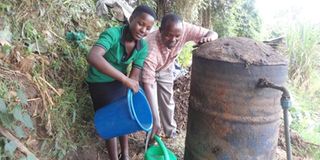You can use garbage to warm bathing water

Juliet Niwabaasa an S5 student at Kigezi High School, assists her teacher, Sabimana to moisten the high carbon dry grass. Photo by Emmanuel Ainebyoona.
What you need to know:
With the ever increasing cost of electricity and the chilly mornings, having an option of warming your bath water will be such a great deal, Emmanuel Ainebyoona spoke to someone who has done it and he explains how it works.
Did you know that garbage and compost generated at your house can help in cutting on the cost of energy used while warming bathing water?
Robert Sabimana, an agriculture teacher at Kigezi High School in Kabale, hascome up with a compost shower technology which is used to heat water for bathing at his home.
The graduate of Kyambogo University says a lot of energy is lost when households dump garbage in the backyard and bury in pits.
“As you walk around homesteads, a lot of waste is burnt ignorantly to reduce the burden of waste,” says Sabimana. To him, the kitchen waste, chicken drops and other biodegradable materials are “gold” since they can be used to generate energy used to warm water for his family.
Having acquired knowledge and skills from Permaculture training in Ethiopia in 2011 as a trainer in homestead ecological farming, Sabimana says he was exposed to a wide range of technologies in agriculture that solely use nature as the source of all that man needs to survive. The father of four says experience from other cultural aspects such as fermentation of local brew in dug out pits has not been appreciated and applied yet there are several lessons.
How the technology works
“At his home in Rugarama in Kabale District, Sabimana uses a metallic tank lined with garbage and animal waste to generate warm water of about 50 degrees centigrade as measured in his bathroom using a hand thermometer.
“The metallic tank is connected to the National Water and Sewerage Corporation pipe and as water passes through the tank it absorbs heat generated by decomposing garbage and animal waste tangled around the tank,” Sabimana says.
He adds that the water warmed during the night is used by the family members to have an early morning shower while the one warmed during day time is used for bathing in the evening. Sabimana says it costs about Shs500, 000, for an individual or family to have a compost shower constructed at their homestead to provide a steady supply of warm bathing water.
Sabimana uses about 200kgs of poultry matter, about 10 litres of compost microorganisms, and sometimes urine. After these materials have decomposed, they generate manure which he uses in his vegetable and maize garden.
Sabimana says the compost shower provides improved environmental hygiene, recycles energy from household waste, and reduces the amount of carbon emission to the atmosphere since the technology doesn’t involve tree cutting or charcoal use. A research study done by Brian Ndyomugyenyi, the technical director of E-Struck Associates Limited, discovered that a compost shower can help on cutting domestic energy bills and also reduce on carbon emission into the atmosphere.
Dubbed, “Thermodynamics, pressure and other engineering aspects of the system economics,” the study indicates that it requires 4,200J of energy to raise 1kg of water by 1K or 10C.
For instance, according to the study, it requires energy worth 2520kJ to raise the water temperature in a 40litre vessel by 15 degrees centigrade. “Important to note is that installed domestic electric water heaters actually heat the water to boiling point (98.5 degree centigrade), thus more energy consumed,” reads the study in part.
Advantages
According to Ndyomugyenyi, if a compost shower is embraced by 10,000 families; this would relieve the atmosphere of more than 9800 tonnes of carbondioxide per year and this translates to approximately Shs176m in terms of carbon trade.
In order to mitigate climate change effects, the United Nations Framework Convention on Climate Change (UNFCCC) under the Kyoto Protocol established the Clean Development Mechanism (CDM) to implement an emission-reduction project in developing countries.
A project like Sabimana’s compost shower can earn saleable certified emission reduction (CER) credits, each equivalent to one tonne of carbondioxide, which can be counted towards meeting Kyoto targets.
A case in point for Kampala city, indicated that on a daily basis, waste generated by Kampala residents under the jurisdiction of the Kampala Capital City Authority (KCCA), amounts to 31,000 tonnes.
Ndyomugyenyi argues that about 100kg of waste is required to heat water in a compost shower for at least three days before they can be taken for use as manure.
“Assuming 10,000 families would use 121666.67tons (333.33tonnes per day) of waste per year for the compost shower,” adds Ndyomugyenyi.
Once adopted by KCCA, Ndyomugyenyi says a composite shower will yield Kampala about Shs1.6b per year out of the available biodegradable waste on the carbon trade market. Carbon credits are paid by industries counties (polluters) to developing countries as a way of offsetting emission of carbondioxide.
He says President Museveni approved the technology during an agriculture exhibition held at Kabale University last year as true and practical.
As the world prepares to embrace the new development agenda dubbed the Sustainable Development Goals (SDGs), which are to be agreed upon in Paris towards end of this year, to replace the Millennium Development Goals (MDGs), Uganda should embrace clean energy technologies to achieve SDG13. It is a specifically calls for action to combat climate change and its impacts.




